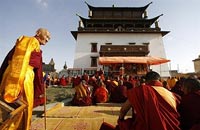




Former Soviet satellite Mongolia has shed the official atheism of its communist past, and religion is making a comeback in the traditionally Buddhist country. And while Buddhism remains a living cultural force, thousands have converted to new faiths.
In a conference of Christian groups last year in Mongolia’s capital, Ulan Baatar, the Church of Jesus Christ of Latter-Day Saints claimed 7,000 baptized Mongolian members, Alicia Campi, a former U.S. foreign service officer assigned to the country, told RFA in an interview.
The Catholic Church claimed 250-300 baptized members, and Protestant evangelicals claimed 20,000 conversions.
“This [last] figure was of course disputed by others,” said Campi, now president of the U.S.-based Chinggis Khan Foundation, a nonprofit group set up to aid Mongolia’s development and promote Mongolian cultural activities.
Former Soviet satellite
At first, foreign missionaries were unwelcome in the early years of Mongolia’s transition to democracy, Campi said.
“The Mongolian government would not accept that as a reason to enter the country, to do missionary work. So you had to come as a tourist, you had to come as a teacher,” she said.
A Soviet satellite from 1924-90, Mongolia needed and welcomed foreign help especially in the fields of orphanage administration, language instruction, medicine, computer science, and business development, Campi said.
“But at the same time, the groups that were paying for this were religious groups who had their own religious agenda.”
Finally, beginning in 1994 and because of international pressure, foreign religious groups were allowed to register in Mongolia as legal organizations, Campi said.

Segie Tumurbaatar, now 31 and working toward a graduate degree in finance in Utah, joined the Church of Jesus Christ of Latter-Day Saints, or Mormons, in Ulan Baatar in 1995. Her conversion was a gradual process, she said.
Tumurbaatar said that a friend once invited her to hear a talk by young missionaries, and that she went as a skeptic.
“[Having been] raised believing that there is no God and that religion is an evil instrument to enslave people, I was determined to convince the missionaries that they were wrong. However, as I heard their message and read the Book of Mormon, I felt peace and joy.”
“The Church teaches us to maintain high moral standards, to abstain from harmful and addictive substances, and to respect and love our families,” said Tumurbaatar, raised by a father who was active in Mongolia’s former communist government and a mother who worked as a civil engineer.
Tumurbaatar said that she had never been attracted to Buddhism and never felt the need to learn more about it, though “while I was learning about Christianity, many Mongolians were going back to the traditional religion.”
“The Buddhist scriptures are all in Tibetan,” Tumurbaatar said, “and the worshipers don’t really know what the monks are saying in their prayers. In addition, the fact that you could go to the monastery and pay money—they have standard rates for different prayers—to get blessings and to get healed never made sense to me.”
Gunjimaa, 29, followed a different path, turning to the Tibetan form of Buddhism practiced by Mongolians for hundreds of years before it was violently suppressed in 1937.
“Interest is growing in Buddhism among our population, especially the young,” Gunjimaa said, adding that she has been involved in “a serious study” of Buddhism since 1999.
Gunjimaa said that as a child, she saw Buddhist texts stacked on a shelf in her family’s apartment. Then, in the 1990s, as monasteries began to be rebuilt, “I used to attend some prayers and used to look after an old lama, helping to wash his robes and bringing offerings to him.”
Now the director of a Mongolian center affiliated with the international Foundation for the Preservation of the Mahayana Tradition, Gunjimaa said that while prayers in Mongolian monasteries and nunneries are still recited in Tibetan, ceremonies held at her center are transcribed and translated into Mongolian.
Westerners working in the country sometimes take part in ceremonies, and the center has become too small to accommodate everyone who wishes to attend, Gunjimaa said.
Alicia Campi said that Western Buddhists have been the most vocal in opposing what they consider the growing “Christianization” of Mongolia. Mongolian Buddhist leaders may not feel they are competing, though, Campi said.
“I can tell you that I have talked to important Mongolian Buddhist religious figures who are willing to work—and receive, of course, financial support—for doing projects with different Christian and Mormon groups.”
Original reporting by Richard Finney. Edited for the Web by Sarah Jackson-Han.